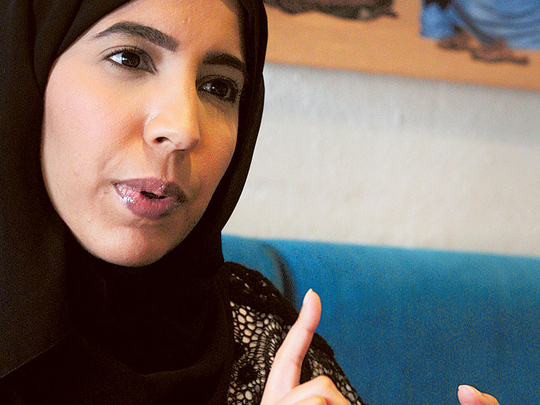
Dubai: Iman Bin Shaibah believes every story should have a lesson. She should know — she oversees a magazine where each article has a point to make.
The editor of Sail, an online monthly focused on Emiratis, is selective about what articles make it to the webpage.
“It’s got to be proper opinion pieces, that’s what differentiates us,” said Iman, an Emirati who started the e-magazine in 2010. Back then there were only two members; now she manages a team of around 30 people — columnists, artists and editors.
Most of them are Emiratis and the magazine content also revolves around issues in their community.
“Employment issues strike a good number of cords. College life, the hardship in starting a new business, and psychology columns are very well read too.”
Ironically, one of Sail’s best read articles was about the declining reading culture in the region. It is this culture she is trying to revive and sustain through Sail, especially in English.
Iman said though there were Arabic-language publications that focus on Emiratis, there was a gap in the English “purely online” readership and writers among UAE nationals.
Sail, she added, has filled that gap.
“There’s a good circle of [Emirati] people I know whose stories are much more than people think. I owe it to them and the readers to bring those stories out. Most people think, ‘oh, it was easy for them; they had the money’ [for example]” said Iman.
Another reason she started Sail was because she “could never really find what I wanted to read. It [the material] was usually one-sided — just politics, business or fashion. We [Emiratis] needed something as a community discussion — talking points, opinion pieces.”
Difficult topics
And that includes difficult topics such as the cultural impact of being outnumbered by expatriates within their own country, issues of national identity, and building understanding between foreigners and Emiratis.
One article in the same vein asks how much is too much when it comes to revealing attire in the workplace.
Other submissions broadly tackle child abuse or women’s rights in a more general sense. There are also interviews with prominent Emiratis, such as Mohammad Harib, the creator of the hugely popular Emirati animation Freej. Reading on, viewers will also come across parenting topics, even economic issues and spirituality.
And there are personal stories are well, seeking to illustrate a point or draw attention to a social phenomena, such as bullying or dealing with the loss of a loved one.
The variety is no accident — Iman said she reads “everything under the sun” and perhaps that’s part of the reason there is such diversity in Sail’s content.
Her efforts have not gone unnoticed, be it from within the community — attracting 10,000 readers per month — or from the wider audience.
In April, she was crowned the winner of the British Council’s Young Creative Entrepreneur (YCE) Digital Publishing Award 2014. More recently, in September, she was, as selected by the UAE embassy in Washington, a delegate for the International Achievement Summit in San Francisco.
Iman is currently developing an “extension of the magazine” online whose “main aspect is to get self-published as is and democratise reading and writing” for aspiring writers.
And though she is “crazy busy” with Sail and upcoming projects, Iman still enjoys her free time by doing what she has always loved — reading.












